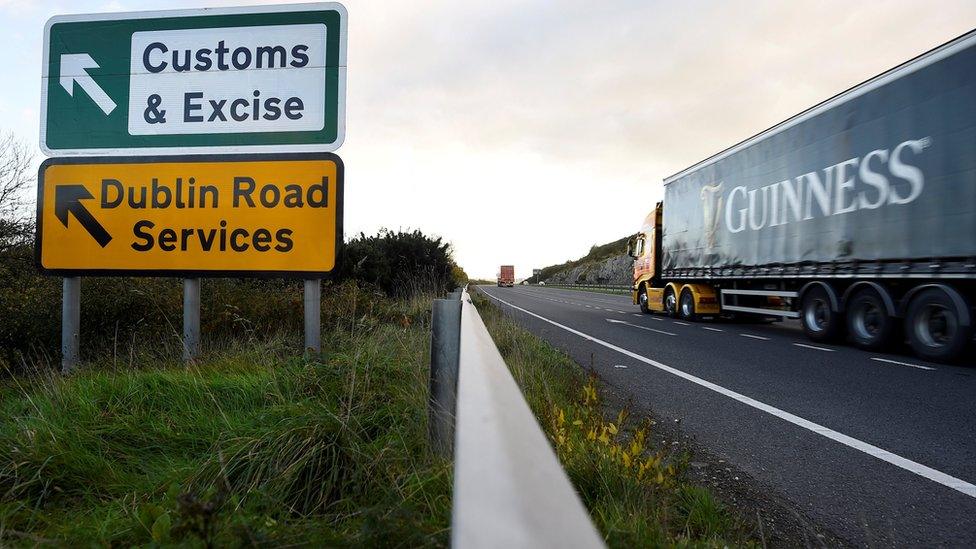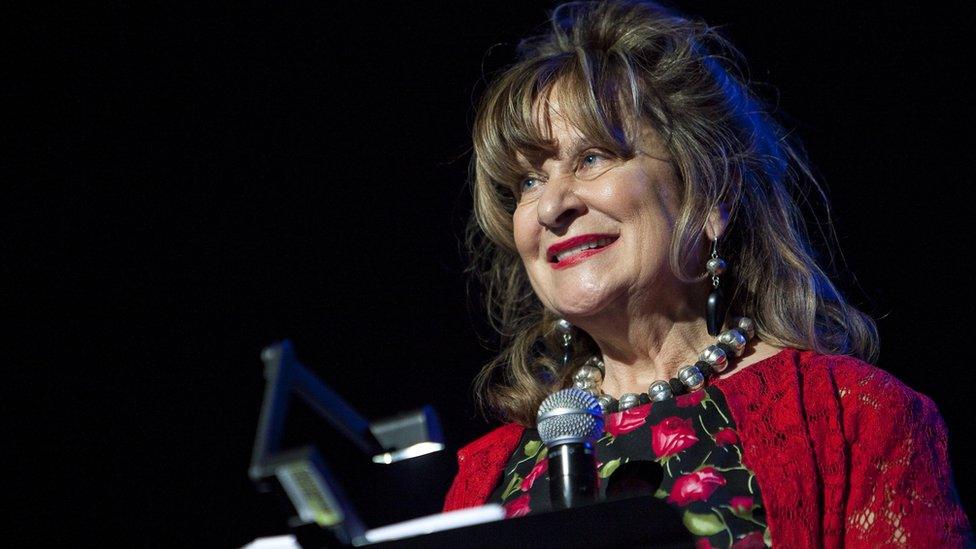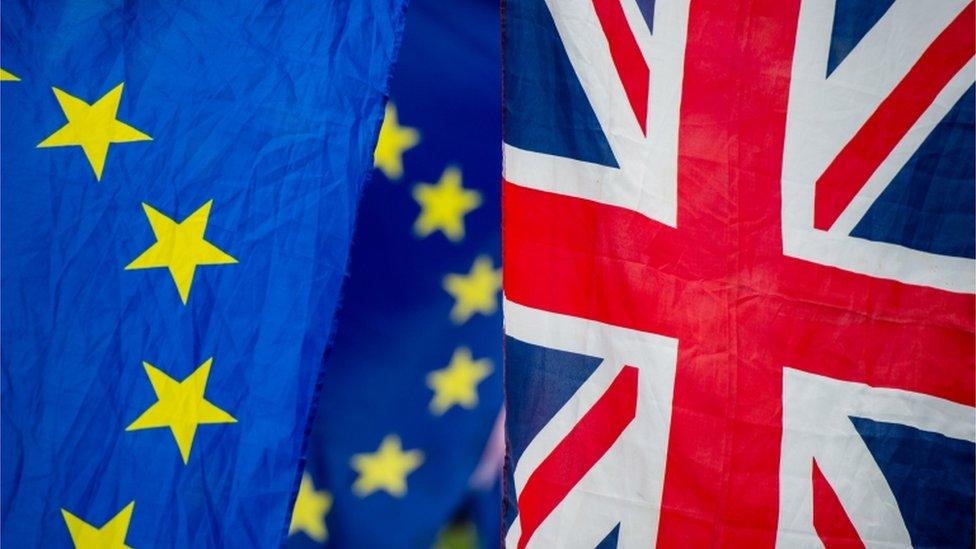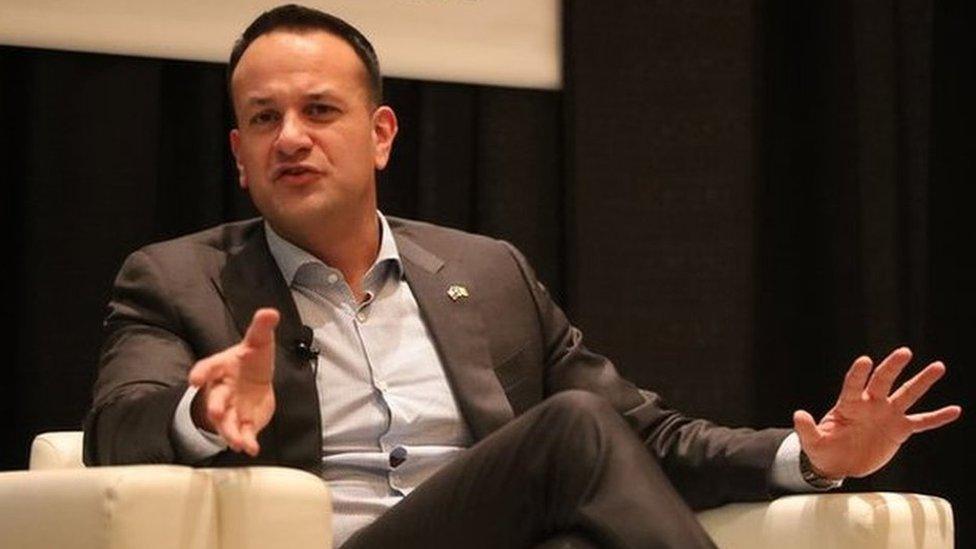Ireland warns UK over post-Brexit border issue
- Published
- comments

The UK government has been told by Ireland to "stand by its commitments" on avoiding a hard border between Northern Ireland and the Republic.
Irish prime minister Leo Varadkar said an arrangement with a time limit would not be "worth the paper it's written on".
The border issue is the main barrier to progress between the two sides.
With time running out, Theresa May, who briefs her cabinet on Tuesday, has to get both the EU and her MPs on side.
The European Union's Brexit negotiator Michel Barnier has said divorce negotiations with the UK are not driven by a sense of revenge and that a no-deal, or a "hard" Brexit, would be a leap into the unknown for Britons living in the EU and EU citizens in the UK.
Speaking at an event in Brussels, Mr Barnier also said any Brexit deal had to maintain an open Irish border to protect peace on the island that has seen decades of sectarian violence.
The UK is due to leave the EU in March, and although 95% of the deal is said to be complete, the tricky bit is proving to be how to honour the commitment by both sides to guarantee no new hard border in Ireland.
It is an issue because after Brexit it will become the UK's land border with the rest of the EU, which has a single market and customs union so products do not need to be checked when they pass between member states.
There have been warnings that a hard border would undermine the peace process in Northern Ireland.
But unless negotiators can make decisive progress on how to guarantee no new visible checks, a special summit to finalise the UK's withdrawal will not take place.
There is disagreement on whether the "backstop" they have agreed to put in place should apply to Northern Ireland, or the whole of the UK - and on whether it can be time-limited or revoked by the UK.
Tory Brexiteers are concerned the UK could end up locked in a customs union with the EU without a fixed end point.
Writing in The Sun, external, former foreign secretary Boris Johnson said this would be an "absolute stinker" of a deal and warned of a "surrender to Brussels" with the UK staying tied to EU rules in years to come.
Mrs May has insisted that any arrangement would be "strictly time limited".
This, however, is not the view of the EU.
On Twitter, Irish Foreign Minister Simon Coveney said a time-limited arrangement - or one that could be unilaterally ended by the UK - would never get EU backing.
Allow X content?
This article contains content provided by X. We ask for your permission before anything is loaded, as they may be using cookies and other technologies. You may want to read X’s cookie policy, external and privacy policy, external before accepting. To view this content choose ‘accept and continue’.
"Still necessary to repeat this, it seems," added the EU's deputy chief negotiator, Sabine Weyand.
And Mr Varadkar said the UK had agreed to a legally-binding "backstop" to apply "unless and until" it is superseded by a new agreement.
"I think it's reasonable for us to expect a country like the United Kingdom and a government like the UK government to stand by its commitments," he said.
Mr Varadkar described the UK as a "divided kingdom" over Brexit, saying this made it "very difficult to come to an agreement".
While the EU has objected to a time-limited UK-wide arrangement, its suggestion of a backstop that is specific to Northern Ireland has been ruled out by Mrs May who says it would undermine the integrity of the UK by creating a new border down the Irish Sea.
The prime minister says she does not think a "backstop" arrangement will be necessary as she wants to solve the border problem through the UK's long-term trade relationship with the EU, which has yet to be agreed.
Mrs May spoke to Mr Varadkar by phone on Monday morning "to take stock of the progress being made", Downing Street said, adding that: "In order to ensure that the backstop, if ever needed, would be temporary, the prime minister said that there would need to be a mechanism through which the backstop could be brought to an end."
The Irish government said Mrs May had "raised the possibility of a review mechanism for the backstop", and that Mr Varadkar had "indicated an openness to consider proposals for a review, provided that it was clear that the outcome of any such review could not involve a unilateral decision to end the backstop".
Lawyers call for referendum

Baroness Kennedy is among the legal figures supporting another Brexit referendum
Meanwhile, 1,400 lawyers have signed a letter calling for another EU referendum to be held.
Among the signatories of the letter are Labour peer Baroness Kennedy QC, former Court of Appeal judge Konrad Schiemann and David Edward, a former judge at the European Court of Justice.
They say questions over the validity of the 2016 vote mean it should not be the public's final word, any more than the 1975 referendum on membership of what was then the European Economic Community.
In the earlier referendum, voters faced a clear choice between alternatives once negotiations had been completed, the lawyers said.
By contrast, during the 2016 vote, "the nature of the negotiation process and its outcome were unknown", said the letter.
"Voters faced a choice between a known reality and an unknown alternative. In the campaign, un-testable claims took the place of facts and reality."
The UK government has said asking the public to vote again would be a betrayal of the public's trust after the result of the referendum in 2016.
A spokeswoman for the Department for Exiting the European Union said that the government was confident of a "mutually advantageous" deal with the EU.
"The people of the United Kingdom have already had their say in one of the biggest democratic exercises this country has ever seen and the Prime Minister has made it clear that there is not going to be a second referendum," she said.
- Published1 November 2018
- Published3 November 2018

- Published3 November 2018

